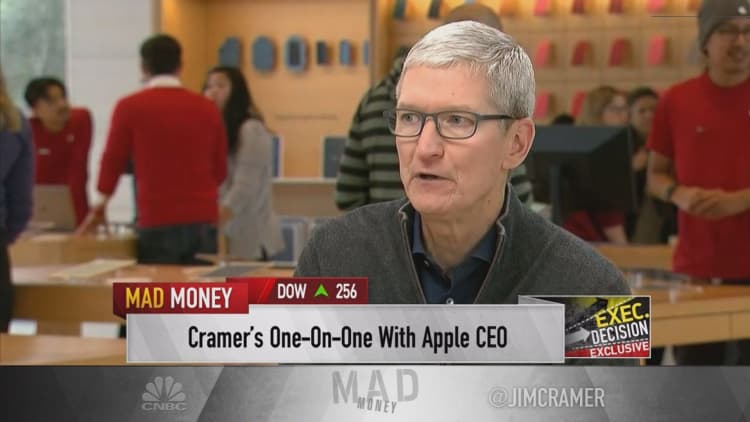
Apple CEO Tim Cook spoke with CNBC's Jim Cramer Tuesday about the company's big initiatives as it tries to recover from a negative start to the year after it warned investors of weak revenue and iPhone sales for its first quarter 2019. As of Tuesday's close, Apple's stock was down 4.4 percent year to date.
In the interview, which airs on "Mad Money" at 6 p.m. ET Tuesday, Cook shares why he is optimistic about Apple's future as well as trade negotiations in China. He also addresses the legal battle between Apple and Qualcomm and predicts that Apple's legacy will ultimately center around its innovations in healthcare.
The full transcript from the interview is below. This transcript has been lightly edited for style and clarity.
JIM CRAMER: Tim, you know I always say, "Own it, don't trade it." But right now, people are saying, "Jim, give me the investment case for buying the stock."
TIM COOK: Well, you know, I never try to sell a stock. I try to sell a product.
CRAMER: Never have.
COOK: However, let me tell you the way I look at it. We manage the company for the long term. The most important things in Apple, one, a culture of innovation. This team is unbelievable in creating hardware and software and services and getting them all to work together. It just works.
Second, we have a very large active install base. It hit 1.3 billion a year ago, and we've added about 100 million in the last 12 months. Third, highest customer satisfaction and loyalty in the industry. So you put those two things together, if you got a lot of a big, active install base, and you got a lot of heavy customers, then you have a recurring revenue stream on your product business.
And then because of our ecosystem that we built, which has unbelievable developers in it and an app store to get services out there, we built a services business that was, you know, a little over $7 billion in 2010. Last year for the calendar year, over $41 billion. And we've said that, you know, we're gonna double the 2016 numbers by 2020.
And so we're on a fast clip there. And then, of course, we are shareholder friendly on our capital allocation. So you put all these things together, and those are the most important things for us: innovation, customer satisfaction, and the overall size and loyalty of our customers.
CRAMER: Okay, so most tech companies, I think, don't innovate nearly as much as you. But let me just posit what we got. You take so many risks that I don't think you get credit for. For instance we had what turned to be ridiculous strings around our neck, and then we got the AirPods.
We loved our dumb watch that told time, and now we have a smart watch that saves our lives. We loved the big, fat jack, and then we got the lightning jack. We loved our Sony, $2,000, mirrorless camera, until we got the iPhone X, which takes better pictures. Why do you, therefore, have a 12 multiple? Because to me, that is wrong.
COOK: Yeah, I think it's wrong, too. But I tell you what I focus on is the customer. And so the customers speak every quarter. They speak every year. They speak every day. And the most important thing for us is that they're satisfied. And so when I read the emails and so forth from customers, they're telling me how the Apple Watch has changed their life.
They're telling me how it motivated them to be more fit, be more active. They're telling me that they discovered that they had AFib. (Atrial fibrillation.) They're telling me they found a problem with their heart that they didn't know existed and if they wouldn't've reached out to a doctor, they might've died.
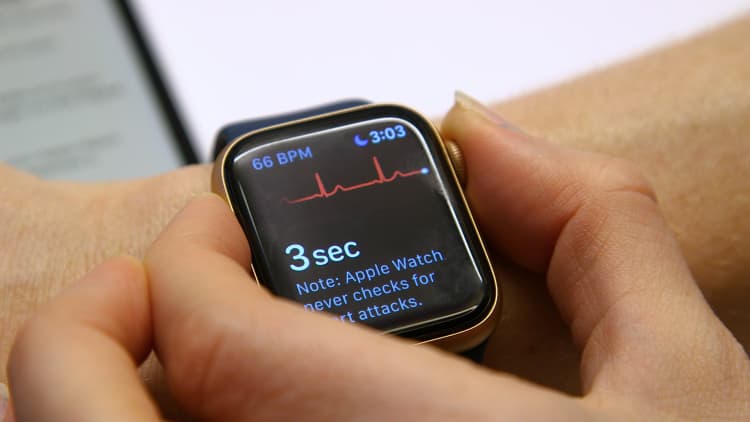
And so these are life-changing things. We've got machine learning embedded in our silicon in our phone. You know, this allows us not only the power efficiency to have an incredible performance in a very small package, but it allows us to manipulate this data on the phone, have the transactions on the phone, as opposed to letting them out in the world.
The whole privacy issue for — we've always been on the right side of privacy. But the market is now moving. And so this is an incredible strength that we've built. The photos that you're able to take with your phone, as you said, I mean, these are life-changing things, if you like to chronicle your life. This morning, I picked up my phone and I saw a memory from a year ago —
CRAMER: I love the memory thing.
COOK: I love it, you know? I see my nephew or somebody that's very important to you. And their face just appears. And you have a slideshow built for you. These things, they're unbelievable. And our customers love them. And that's the most-important thing.
CRAMER: But okay, so let's unpack that. My daughter has the 5. Why? 'Cause she loves it. She said, "Listen, Dad. If you put it in the washing machine, like your wife did, I'll get a new one. But you can't (COOK LAUGHS) pry it outta my cold, dead hands, 'cause I love it." She is not an upgrader, because you made the greatest product. What do we do about that? What do you do?
COOK: Well, the most important thing, for me, is that she's happy. That is the most important thing. Now, if she's not upgrading for another reason, maybe it's too much of a hassle for her to upgrade. Maybe she's worried about the transfer of data.
All of this stuff, we wanna help on. And do you know, we've got the store that you're in that's very focused on having the best customer experience there, helping people set up their new phone, making sure all their data's transferred, and also-- allowing them to trade in their current phone, which begins to look like a subsidy that the carrier may have previously provided. And it offsets some of the cost of the new phone.
CRAMER: Okay, so these issues are all occurring at the same time that we do have China. You were very abject about China and the 100 percent of the upside that went away. There are issues involving perhaps, not boycotts, we know that's off the table, but patriotism, in a strange way, meaning that, you know what? If I can get a Huawei with a subsidy, why should I buy an Apple that's conspicuously American. How long can that last?
COOK: Well, I think here's what we saw in China in specifically. The Chinese economy, it seemed to us, began to slow, maybe, in the second half of the year. And it was on some sort of rational trajectory. We believe, based on what we saw and the timing of it, that the tension, the trade-war tension with the U.S. created this more-sharp downturn.
I believe that's temporary. Because I think that, when you really look at it, it's in both countries' best interests to come to an agreement. It is a complex, very complex trade agreement. And it needs to be updated. But as I've said before, I'm very optimistic that this will happen. And so that clearly will be good, not only for us, frankly, but I think more about the world in general. The world needs a strong U.S. and China economy for the world economy to be strong.
CRAMER: My understanding is even the hardliners in the White House have moved on this issue. Now I know that President [Donald] Trump calls you a friend, I know that you go back and forth because you're represent the greatest that we have in America. And my understanding is that there are people who feel exactly like you, which means a deal's possible.
COOK: I think a deal is very possible. And I've heard some very encouraging words.
CRAMER: Even of recent, right?
COOK: Yes, yes, very recently. And I don't speak for them, obviously. I do talk with them. And I give them my ideas and thoughts.
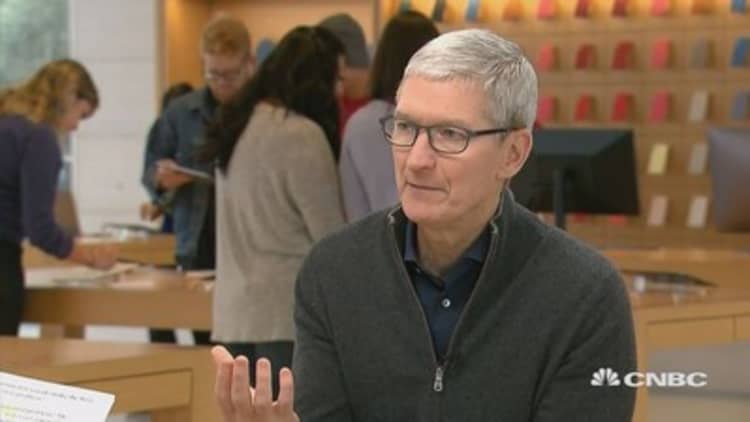
CRAMER: Okay, now, we gotta talk about some of these people who, the naysayers. And we've dealt with them before, when the stock was substantially lower. A Wedbush analyst said Apple's clearly the darkest days, representing a challenge in growth. Journal, It's too soon to call the XR a flop, only after a few months. But early indications are, of course, it's a flop. What do you say to people who say XR flopped? What do you say to, say, darkest days?
COOK: I say bologna. I call bologna on that. Let me tell you how I view this. Here's the truth, what the facts are. Since we began shipping the iPhone XR, it has been the most popular iPhone every day, every single day, from when we started shipping, until now.
CRAMER: But how about relatively? I mean, there's been other ones that have —
COOK: I mean, do I want to sell more? Of course I do. Of course I'd like to sell more. And we're working on that. But in terms of the product itself, it's an incredibly innovative product. It has a bunch of advanced technologies in it from the chip with the neural engine to security embedded to an edge-to-edge liquid retina display, the first in the industry, longest battery life ever in an iPhone.
I mean, it is unbelievable. And the photos that you can take of your life and of your loved ones, I mean, it beats many, many of the standalone cameras that you could buy now that nobody uses anymore. And so these things give a lot of value to the customer. So that's that.
In terms of the naysayer, I've heard this over and over again, Jim. I've heard it in 2001. I've heard it in 2005 and '07 and '08 and '10 and '12 and '13. You can probably find the same quotes from the same people over and over again. And I'm not defensive on it. This is America. And you can say what you want. But I'm giving you my honest opinion is that there is a culture of innovation in Apple. And that culture of innovation, combined with these incredible-- loyal customers, happy customers, this ecosystem, this virtuous ecosystem, is something that is probably underappreciated.
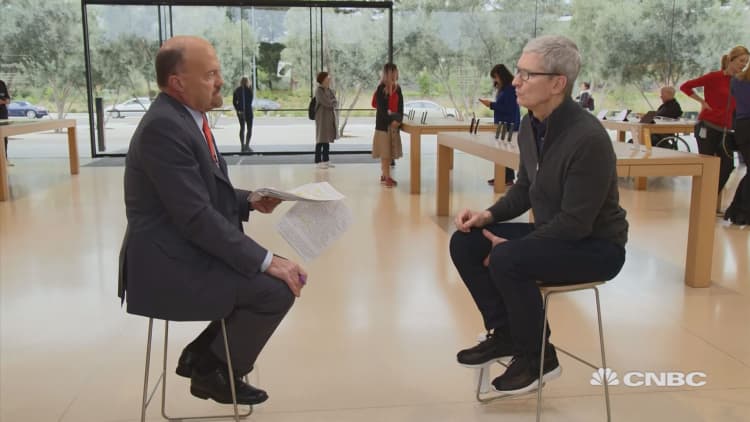
CRAMER: Well, then you were surprised with the market reaction to both when you decided to not reveal units and when you revealed the shortfall.
COOK: I'm never surprised by the market, to be honest with you. Because I think the market is quite emotional in the short term. And we sorta look through all of that. We think about the long term. And so when I look at the long-term health of the company, it has never been better.
The product pipeline has never been better. The ecosystem has never been stronger. The services are on a tear. If you look at, let's just take wearables as an example, right? Wearables, it's mainly the Apple Watch and AirPods.
If you look at this, and on a trailing basis. I'm not projecting. On a trailing basis, they've we've already exceeded the revenue for wearables is already more than 50 percent more than iPod was at its peak. Now, this is a product that I think everybody would say it was an incredibly important product for Apple, full of innovation, and probably, the trigger for the company getting on a very different trajectory and into other markets.
And so already, exceeded it by 50 percent at its peak. At its peak. Also, if you take AirPods and the Watch separately, and you sort of back these up and align it to the launch date of iPod, as well, and, you know, where all of them have a comparable amount of time, you would find that each one, independently, is, like, four to six times ahead of where iPod was at a comparable period of time.
And so AirPods are becoming ubiquitous out there. People love them. I get notes every day. They're chock full of tech. But they just work. It's the elegance of them, but with significant technology and built right in and an unbelievable user interface.
[Break]
CRAMER: I've been following stocks for 40 years, Tim. And you guys are a fountain of innovation. My wife said, "Tell him, what do they want? Time travel?" (LAUGHTER) What do you have to do?
COOK: Hey, time travel sounds kinda cool.
CRAMER: Right? The reason I mention it is because there are companies that sell at 22 to 23 times earnings, they are the consumer packaged goods companies. There are companies that tend to go from 1 to 4 percent. If they get 5%, then they get a 28 multiple.
And yet, the analysts who follow your company continue to look for units of phones, they're not thinking about the revenue. And yet, if it were Procter & Gamble, and they got that many razor blades, they'd pay 28 times earnings. Are you followed by the wrong people?
COOK: I think that our story isn't well understood. I think Apple is not well understood in some of Wall Street. For example, I think there are several people that believe the most important metric is how many iPhones are sold in a given 90-day period or what the revenues is.
This is far, far, far down my list. The point is, if somebody decides to buy an iPhone a little later, because of the battery, huge discount that we gave, they decide to hold on a little longer, I'm I'm great with that.
I want the customer to be happy. We work for them. And so the important thing is that they're happy. Because if they're happy, they will eventually replace that product with another. And the services and the ecosystem around that will thrive.
CRAMER: But as long as it's north of 60 percent, I mean, as long as cell phones are north — I don't know how you get people to think, even if it's $20 billion in service revenue. It's the 62 percent. It is overwhelming. And they don't know what to do. And I understand their conundrum, Tim. They don't know what to do. Because the cell phone's such a big part of the pot.
COOK: Yeah, but if you really back up and look at Apple — in our last fiscal year, we had $100 billion of revenue that was not iPhone, $100 billion. And in this last quarter, if you take everything outside of iPhone, it grew at 19 percent. Nineteen percent on a huge business.
CRAMER: That's — again, it's a consumer packaged goods company but not a tech. Why not accept it and say, "You know what? We're just — we wanna be covered by other people"?
COOK: (LAUGH) I don't think we get to pick who we're covered by —
CRAMER: Well, I don't know. You're a big company. Maybe you could. Now, I've got some ideas for you, okay? I talked to some people at Walmart yesterday. An arrangement with Walmart, Flipkart to take over India with a budget phone, rather than doing it piecemeal.
COOK: Yeah. For us, we're about making the best product that enriches people's lives. And so we're not about making the cheapest, right? We want to make a great value. But that's not necessarily the cheapest. And so for us, what we've seen is there's enough people in every country in the world that we play in that we can have a really good business by selling the best phones.
Now, the best phones, we knew that, as we went to the X and then the follow-on of the XS and the XS Max, that everybody would not want to spend $1,000 for the phone. So we made the iPhone XR. And we put as many of the advanced technologies as we could in that phone--
CRAMER: Well, let Flipkart do the subsidy.
COOK: And we priced it right between the 8 and the 8 Plus of the year before. But in India, in general, we are all in. It is a major focus. If you look at how we've done, over the years, we've gone from a $100, $200 million business to, last year, we exceeded $2 billion.
That $2 billion was flat, year over year, after rapid, rapid growth. And so we have more work to do. We'd like to put stores there. We would like some of the duties and so forth that are put on the products to go away. And we're working closely with the team there. And I believe that we'll have better results at some point in the future. I'm not in the forecasting mode here today. But it's an important market for us.
CRAMER: You have people who are naysayers. One of the naysayers is not an analyst. It's Qualcomm. Qualcomm keeps telling you, over and over again, "You're gonna come to the table. You have to. Lost the suit in Germany. Lost the suit in China. Wait 'til you see them cave." Are you gonna cave?
COOK: No. Look, the truth is, we haven't been in any settlement discussions with them since the third calendar quarter of last year. That is the truth. So I'm not sure where that thinking is coming from. The issues that we have with Qualcomm is that they have a policy of no license, no chips. This is, in our view, illegal. And so many regulators in many different countries agree with this. And then secondly, the obligation to offer their patent portfolio on a fair, reasonable, and nondiscriminatory basis. And they don't do that. They charge exorbitant prices. And they have a lot of different tactics they use to do that. And that's not just us saying that. I mean, you can see what's coming out of the FTC trial here in the United States. And obviously, I have an issue with some of their other tactics that I'm sure you've read about.
CRAMER: Right, that they say you are in settlement talks all the time.
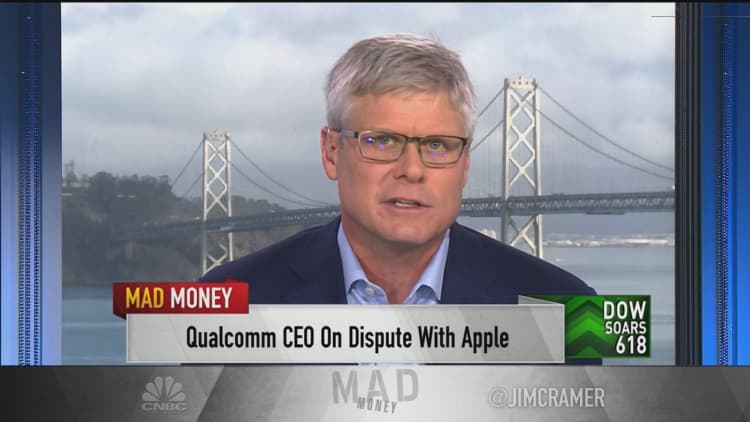
COOK: Well, not just that, but paying somebody to write fake news and then promoting it. This is stuff that should be beneath companies. This is not how things should operate.
CRAMER: All right, so let's talk about competition. The other company that I think of innovation I always have to talk about is Amazon. And they do great voice. You have voice. It's a bit of a contest. If you had sort of unlimited capital, and you throw it at voice, would it make Siri even better?
COOK: Well, we're putting a ton of investment in Siri. And so if you look at Siri today, Jim, we have about a bit over 500 million devices that are using Siri out there, Siri enabled. And Siri's used over 10 billion times a month. And it's in 21 different languages and 30-something countries.
And so we've tried to do we tried to create a global product. We're not in every country yet. We want to be. And if if you want something that is something that has been created in your device, Siri is the best place to do that.
I get more and more great things every day. The quality is is going up. You know voice is a never-ending journey. We all speak a bit differently. I have a southern dialect, not as southern as I used to. But there's a lot of stuff to do there. But I'm highly confident in our ability to keep innovating like crazy there.
CRAMER: Okay last question. Healthcare, if you hooked up with different — could you make it so that I can sync — I need to sync — I need the handshake with my doctor, okay? And payments, it's gonna be huge. If you look at a PayPal, they've got a 30 multiple...can you layer either one of those on to be able to jump, even though it's huge, the service stream, make it so that it's 40% of your company, by doing more in payments, more in health?
COOK: On services, you will see us announce new services this year. There will more things coming. I don't wanna tell you about what they are —
CRAMER: Material?
COOK: I believe it'll be material over time. I'm not gonna forecast precisely, the ramps and so forth. But they're things that we feel really great about, that we've been working on for multiple years. On the healthcare, in particular, and sorta your wellbeing, this is an area that I believe, if you zoom out into the future, and you look back, and you ask the question, "What was Apple's greatest contribution to mankind," it will be about health.
Because our business has always been about enriching people's lives. And as we've gotten into healthcare more and more through the Watch and through other things that we've created with ResearchKit and CareKit and putting your medical records on the iPhone, this is a huge deal.
And it's something that is very important for people. We are democratizing it. We are taking what has been with the institution and empowering the individual to manage their health. And we're just at the front end of this. But I do think, looking back, in the future, you will answer that question, Apple's most-important contribution to mankind has been in health.
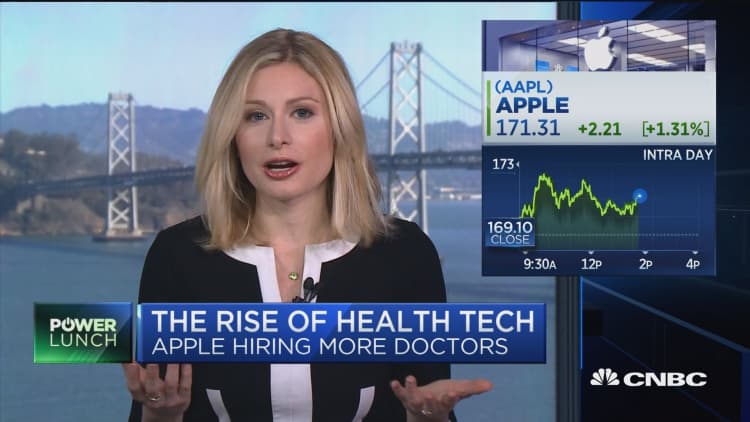
Programming Note: For more on Apple, watch Tim Cook's full interview on "Mad Money" tonight at 6 p.m. ET.
Disclosure: Cramer's charitable trust owns shares of Apple.
Questions for Cramer?
Call Cramer: 1-800-743-CNBC
Want to take a deep dive into Cramer's world? Hit him up!
Mad Money Twitter - Jim Cramer Twitter - Facebook - Instagram
Questions, comments, suggestions for the "Mad Money" website? madcap@cnbc.com



